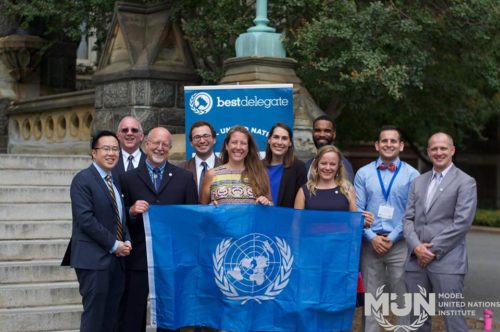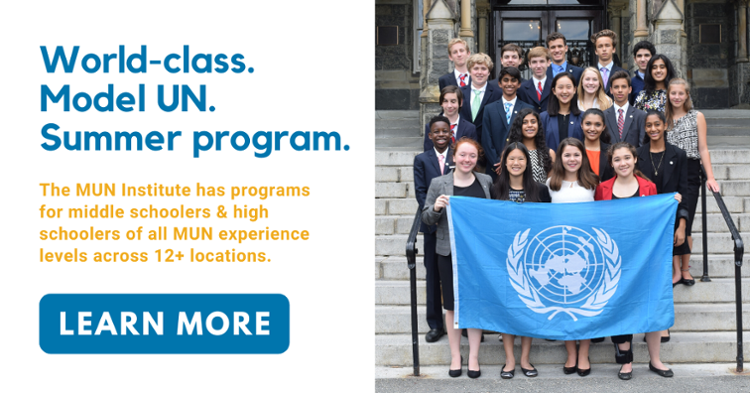
Being a Model UN advisor (some regions call it director, moderator, coach) is a rewarding but time consuming job. You get to see students learn about global issues, build their leadership skills, and become inspired to go change the world. But it can be a lot of time and work trying to prepare all your students for Model UN conferences.
Yet, there are large, thriving after-school Model UN clubs out there. What are their advisors’ secrets to success? Here are 3 things top Model UN advisors do:
Empower their Student Officers to Lead the Model UN Club
Top advisors understand there is not enough time to do everything to run a Model UN club. And they understand that they want to empower their students to take on leadership roles. Setting up a good “Secretariat” structure — a set of student officers — is key. My own advisor understood that, and he was able to empower us as student officers to grow our after-school MUN club from 20 members to 120 members.
There are a handful of roles and responsibilities below that can be given to student officers at the very minimum:
- President: runs Secretariat meetings and club meetings
- Head Delegate: prepares and trains delegates, especially new ones
- Secretary-General: organizes the team’s mock session conference
- Secretary: membership recruitment and tracking for participation
- Treasurer: fundraising and tracking for payments
And the secret is that the Secretariat can be scaled according to your club’s goals and size. There can be Assistant Head Delegates and Undersecretaries-General to help the Head Delegate and Secretary-General, respectively, and other student officer roles as well. Even having mentor-mentee pairings can empower your experienced half of the club to train the novice half of the club.
Student officers can attend the Secretary-General program at the Model UN Institute to learn the best practices in running and growing a Model UN club.
Select Well-Organized Model UN Conferences
Well-organized Model UN conferences will provide your students with better experiences and save you time as advisor. Well-organized Model UN conferences will have clear timelines, communicate well, and publish well-written background guides. You can see all this on the website already without having attended the conference before.
The best conferences feel automated — you tell the students to visit the conference website and all the information is there. The worst conferences feel like herding cats — you’re chasing after the conference for information and your students are complaining to you at the same time (usually about why the background guides have not been posted yet).
Of course, well-organized can also refer to quality of the on-site experience such as logistics, chairs, and so forth. But you won’t know those until you get there, and even then it can vary year-to-year and committee-to-committee since student-run events are not necessarily consistent. The best thing is to ask other advisors for reputations — which ones are generally well-organized on most years. You can also check out the How to Select Conferences guide.
Share Model UN Resources to their Students
Most advisors have never done Model UN. Even advisors who coach some of the top-ranked Model UN teams have never done Model UN. That was the same case for my own Model UN advisor. But he leveraged other advisors’ expertise — he would attend faculty advisor meetings, connect with other advisors, and ask them about what resources they use to prepare for MUN conferences. The other advisors would always share — some of them would even share their entire training packets.
Nowadays there’s a wealth of Model UN resources out there:
- New delegates can visit the Getting Started page and read the Diplomat Guide.
- Advanced delegates can read up on the most popular strategies and read the Ambassador Guide.
- Delegates who want to learn how to do Crisis committees can check out the Crisis guide.
- Any delegate can follow our Research page and use our Research Map and NGO List.
- And those who want to take their skills to the next level can attend the Model United Nations Institute.
The key to sharing resources is to hold students accountable to using them. Ask them to share or implement something they’ve learned at their next after school practice. Ask them to show each other how they improved their position papers after using the Research page, Research Map, or NGO List. Better yet, have the student officers teach something from what they’ve learned — after all, teaching is the best way of learning for them AND they save you time as they become the coaches for the team!
Ready to take your Model UN program to the next level?
Sign up for the Advisors Institute, a weeklong professional development program for Model UN advisors held in the summer!



